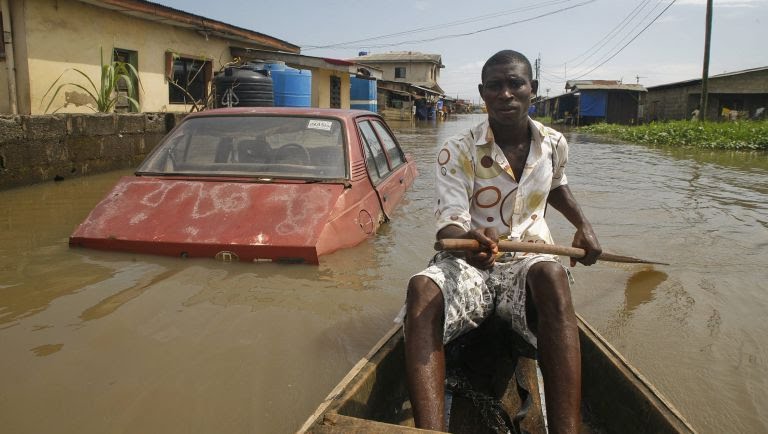Planning For A Better Tomorrow!!!
.jpg)
.jpg)
Earlier last year heavy rains and thunderstorms caused havoc in Lagos, Nigeria’s economic nerve centre and one of Africa’s most populous cities. Residents woke up in many parts of the city to find their streets and homes flooded and their property, including cars and other valuables, submerged.
Pictures and videos later posted online showed dramatic and even bizarre scenes of flooding in the city, including the capture of a crocodile in the floodwater.
Lagos has not been alone. Suleija, a town near the capital city Abuja hundreds of kilometres away, suffered its own flooding challenge in early July. Heavy rains washed houses away and caused others to collapse, where few individuals lost their lives.
.jpg)
Some of the worst flooding in recent memory happened five years ago in March 2012 when 32 of Nigeria’s 36 states were affected, 24 severely, almost two million people were displaced.
The seriousness of the flooding was attributed to a combination of two events: very heavy local rainfall and the release of excess water from the Lagdo Dam in nearby Cameroon.
.jpg)
Although the degree and seriousness of flooding in Nigeria fluctuates, flooding remains a recurring phenomenon in most parts of the country. The first factor aggravating flooding is climate change, which has been shown to contribute to more extreme storms and rainfall. Another factor contributing to flooding in cities is that Nigeria has experienced rapid urban growth and planning is poor.
The problem of flooding is not peculiar to Nigeria alone. In 2007, floods affected 1.5 million people across several countries in Africa, including Uganda, Sudan, Kenya, Ghana, Ethiopia and Niger. Alluvial flooding is common for major rivers—such as Nile, Niger, Benue, Orange, Zambezi—in Africa. Major cities in Africa are also susceptible to fluvial flooding which occurs when excessive rainfall, over an extended period of time, causes rivers to overflow.
Why Pangs of Suffering
.jpg)
Rainfall patterns in Nigeria (1978 to 2007) suggests that rainstorms are getting more intense. The data show that there are fewer rainy days, yet the total yearly amounts of rainfall have not changed much from previous decades. This means that more rain is falling on the days that there is rain, which in turn means that rain storms in the city are getting more intense, increasing the threat of flooding.
.jpg)
In addition to more intense rain storms, the other possible cause of flooding in coastal regions is rising sea levels. Although up-to-date data on the rising sea levels in Nigeria are scarce, it’s believed that if nothing is done, this is likely to aggravate flooding in the future, particularly in coastal cities.
In Nigeria’s cities, the most common cause of flooding after excessive rains is poor drainage systems that can’t cope. This is called pluvial flooding.
Looking Through the Global Spectacle
Urbanisation and industrialisation increase the number of roads and buildings. This in turn increases the proportion of surface area where water cannot be absorbed into the ground, leading to rapid runoff which then causes flooding during storms. And in cities that manage their infrastructure well, storm water drainage systems are built so that water can be directed to rivers efficiently and quickly.
These low-lying areas are particularly at risk of flooding, and the situation is complicated by buildings being constructed on water ways, and bad waste dumping habits which block the drains.

What must be done
It’s clear Nigeria needs to take measures to cope with flooding. This will require both local and international interventions, and could include early warning and rapid response systems, flood data gathering and modelling, proper urban and spatial planning, flood emergency preparedness and political will.
Rendering Selfless Service
The country can learn from others. For example, in Mumbai, India various measures have been implemented to reduce the impact of flooding. These have included an emergency control centre, automated weather stations, removal of solid waste from stormwater drains and the development of emergency response mechanisms.
Article Exerpt Link
People Whose God Is Their Belly!!!!
Reference to the above article, it has revealed that there are many causes to flooding and other environmental breakdown (building collapse) as duly identified above, but the reality is that we all must embrace living selflessly, do more than you are paid for: It's not true that we couldn't affect our environment positively but it's because our world today is filled with people whose belly have become their god, they live for themselves and their family.
It is an obvious truth that can not be denied that there were no early signs in most cases, from weather forecast and environmental analyst that flooding is an imminent, and it is unavoidable, but because some people do not care about other people,their families, their properties , because they could fly their family abroad at anytime and at any day; they fail to protect the lives of the masses, the very people that empowered them.
We all must learn not just how to create wealth but it must be wealth creation through a sane value system. If you are in any position of public service, serve to the best of your capacity, especially when you are not watched. Many of us are guilty today, we cut budgets, estimates and yet we build with sub standard materials; let's all take responsibility so that the future generation will hear and celebrate our courage,commitment and sacrifices.
Do your best and be the best, lastly, operate from your field of glory, remember, everyman will receive his reward in due time, do not cut corners, be the best that you want the world to be.
You all should enjoy the rest of your day.